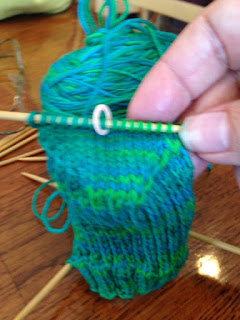I haven't been knitting that much, since moving to Texas last year. For one thing, I felt overwhelmed at first. For another thing, people kept telling me that I would never need those warm socks and footies that I loved knitting. And when it's 100 degrees out, and it plummets to about 85 at night -- well, it just doesn't seem like knitting weather.
But, the temperature has been dipping down a little lower lately. Also, it is Advent now, just barely. So I got out my trusty knitting needles and threw caution to the wind. I started knitting a pair of footies.
It is not a bad way to spend Advent.

One of the first words we hear in Advent is "Wait." Wait, because it is God who is coming to us, and not the other way around. And we can pray for God to come quickly (and sometimes we even do), but there is not one thing we can do to MAKE God come. This one is on God. Salvation is on God, not us.
I don't know about you, but waiting drives me crazy. And that waiting when it is clear that what you are waiting for is on the other person -- that drives me the craziest. Waiting in the doctor's office, so that the doctor can tell me what is wrong and how to fix it, and then give the right medicine -- waiting for the electrician to come and re-wire the basement -- waiting for the plumber to come and fix the leak -- that is the hardest thing.
So I think that waiting in Advent may be in part to remind us about the things that we can do, and the things we can't do. As it turns out, only God can save us. Only God can heal what is ultimately wrong. Only God can bring the kind of light we need, and place that light within our hearts. Only God can bring the living water, so that we will never be thirsty. Only God can knit our hearts back together, only God can knit us together with him, so that we are joined unbreakably to love and to life and to hope and to peace.
Only God can do it. And he has. And he does. And he will, again.
But in the meantime, we wait. But while we wait, we are reminded that there are things we can do. They won't make Jesus come more quickly. But they are things that testify to our hope.
So many of us light the candles. One a week. And as the light of the candle grows, we remember that he is coming to us, he is coming to us -- that he walks among us, inhabits our world, our lives, and even our bodies. Our hands.
So we light the candles. There are so many ways to light the candles: by giving away bread, by sharing a cup of water, by holding the hands of the dying, by standing up for the vulnerable, by welcoming the stranger.
As for me, today I will knit. And I will consider the one who, by his grace, inhabits even my hands, even our hands, and who has knit us all together by his love.